|
Influencing
Generations of Ministers
By Rod and Sherry Boyd
It was a quiet milestone. After serving
16 years in pastoral ministry, we’ve now completed 16 years
of missionary service. It’s a good time to pause and
reflect! Our focus during our pastoral years was Christian
education and facilitating effective ministry. Our
missionary ministry is guided by God’s call to raise up
Christian leaders.
 As
missionaries we have learned that our principle role is not
to mandate ministry. We are guests in the countries we
serve. We lead by influence rather than by authority. We are
in charge of ministries that exist to serve. We are stewards
of a shared vision; and even that vision comes from the
Lord. As
missionaries we have learned that our principle role is not
to mandate ministry. We are guests in the countries we
serve. We lead by influence rather than by authority. We are
in charge of ministries that exist to serve. We are stewards
of a shared vision; and even that vision comes from the
Lord.
This describes the ministry of the
Resource and Advisory Center. The Center serves more than
900 Bible schools, extensions and study centers in the 20
Spanish-speaking countries of Latin America and the
Caribbean. If you’re up to the challenge and would like to
strengthen your Spanish, please visit the Center’s website,
www.ElAsesor.org.
In the last few weeks we have conducted
some important meetings and offer the following reports:
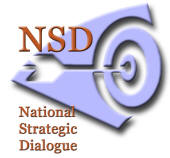 National
Strategic Dialogue—Costa Rica, February 2009 National
Strategic Dialogue—Costa Rica, February 2009
One of critical needs we have observed in
our work with Bible schools throughout Latin America is the
lack of a cohesive national vision and strategy for
ministerial training. As a result we began conducting
National Strategic Dialogues (NSD) in different countries.
The purpose of the 10-hour intensive
Dialogue is to:
-
Reflect upon the unique history and
founding values of the Bible school(s) in the country.
-
Evaluate and revise these values
based upon the perspectives of the national church,
Bible school leadership, professors and students.
-
Express the purpose and values of the
Bible school in a concise Mission Statement.
-
Begin strategic planning focusing on
one needy component of the statement.
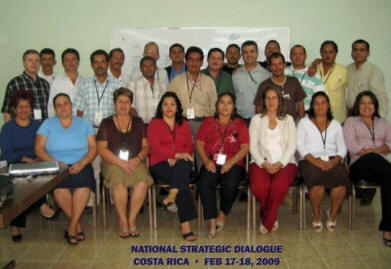 The
NSD in Costa Rica in February was the sixth that we’ve
conducted. Although the same methodology is used, each
strategic dialogue takes its own course. The 25 Costa Rica
Bible school leaders present developed the following mission
statement: The
NSD in Costa Rica in February was the sixth that we’ve
conducted. Although the same methodology is used, each
strategic dialogue takes its own course. The 25 Costa Rica
Bible school leaders present developed the following mission
statement:
“We are a Pentecostal theological
institution committed to excellence in the integral training
of workers, cooperating with the church in the expansion of
the Kingdom of God.”
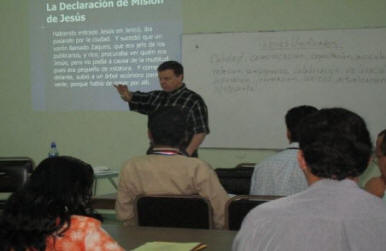 This,
of course, is a translation. Each Spanish word is carefully
chosen and is packed full of meaning. It’s safe to say that
the mission statement loses a lot in translation. But this
statement, especially the process used to develop it, now
guide the team of Costa Rican leaders, pastors and directors
to implement this vision both nationally and locally in each
Bible school. This,
of course, is a translation. Each Spanish word is carefully
chosen and is packed full of meaning. It’s safe to say that
the mission statement loses a lot in translation. But this
statement, especially the process used to develop it, now
guide the team of Costa Rican leaders, pastors and directors
to implement this vision both nationally and locally in each
Bible school.
International Educational Leaders
Dialogue and Bible School Curriculum Review
Commission—Panama, March 2009
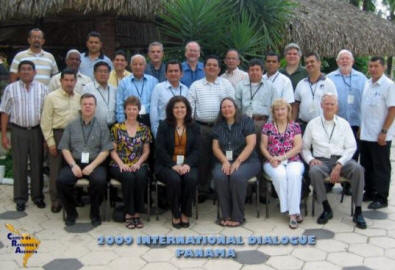 Less
than two weeks after the NSD in Costa Rica, a group of 27
Superintendents, National Bible School Directors,
missionaries and international ministry leaders gathered in
Panama City for the 2009 International Educational Leaders
Dialogue. We host this event every two years. Less
than two weeks after the NSD in Costa Rica, a group of 27
Superintendents, National Bible School Directors,
missionaries and international ministry leaders gathered in
Panama City for the 2009 International Educational Leaders
Dialogue. We host this event every two years.
This year’s Dialogue was unique because
we scheduled the Bible School Curriculum Review Commission
meeting for the first two days and invited all to attend
both meetings. All but a couple attended both meetings. The
Curriculum Commission has been working for the last two
years on updating the basic curriculum plan. The new plan
will be presented to the Latin America Christian Education
Committee that will be meeting in September. This committee
is made up of the superintendents, directors of Christian
education and international ministry leaders from the 20
Spanish-speaking countries of Latin America and the
Caribbean. Half of those leaders were present for this
commission meeting, strategically important for preparing
for the presentation of the new plan.
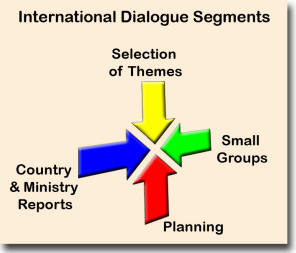 After
two days of curriculum planning, the group was warmed up to
move into the Dialogue. The Dialogue uses a tested and
proven methodology that includes four segments: After
two days of curriculum planning, the group was warmed up to
move into the Dialogue. The Dialogue uses a tested and
proven methodology that includes four segments:
1. Country and Ministry Reports.
Each country provides a report for the previous year that
includes statistical information, new programs, needs and
challenges. Each country is asked to identify a single
urgent need for Bible School ministry in its country.
International ministries also report and are asked to
indicate a need. Each need is added to a list of
nominations.
2. Selection of Themes.
The list of nominated needs is reviewed. Similar needs are
consolidated. The large group then selects 3-5 needs to
consider in the Dialogue.
3. Small Groups. Attendees
number off and small groups are formed. Each group draws a
theme “out of the hat,” thereby leaving “to the Lord” the
assignment of themes to small groups. Groups are asked to
fully define the need, brainstorm a list of possible
solutions and develop a preliminary plan and timetable. Each
group presents a written report that is shared with the
large group.
4. Planning. The group in
session serves as the International Bible School Committee.
Time is spent reviewing and updating ongoing initiatives and
agenda items from previous meetings, as well as considering
new items based upon the Dialogue experience. This planning
segment also includes preparation for the International
Educators Summits that take place the following year.
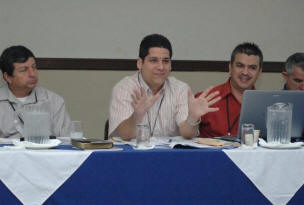 This
year’s reports were interesting as always. We were
privileged to have Osmany Cruz, the director of the Cuban
Bible school program. It’s amazing to think that there are
3,628 Cubans attending the Bible school program. The Cuban
program is distinct because they don’t have a building. They
have 12 extension sites and dozens more study centers,
mostly in homes. The single greatest need that the Cuban
program has is the distribution of materials to the various
study sites. One of the superintendents present, under the
direction of the Holy Spirit, committed each country to
raise funds to help purchase a truck for the Assemblies of
God of Cuba! It was an incredible moment. This
year’s reports were interesting as always. We were
privileged to have Osmany Cruz, the director of the Cuban
Bible school program. It’s amazing to think that there are
3,628 Cubans attending the Bible school program. The Cuban
program is distinct because they don’t have a building. They
have 12 extension sites and dozens more study centers,
mostly in homes. The single greatest need that the Cuban
program has is the distribution of materials to the various
study sites. One of the superintendents present, under the
direction of the Holy Spirit, committed each country to
raise funds to help purchase a truck for the Assemblies of
God of Cuba! It was an incredible moment.
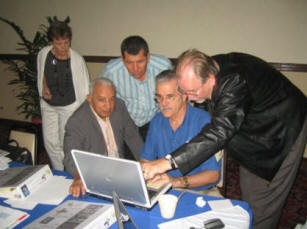 Because
of the larger attendance this year, five small groups were
able to consider five different needs: Because
of the larger attendance this year, five small groups were
able to consider five different needs:
1. Equipment and Library needs for Bible
schools
2. Unified educational program that
includes standards, textbooks, accreditation, curriculum
plan, national vision and Pentecostal identify
3. Effective and ongoing training of
teachers that fulfills international standards
4. Improve training of students based
upon established profiles that have a balance of knowledge
and practice.
5. Encourage and maintain a
contextualized Pentecostal emphasis in each Bible school
2010 Educators Summits
Managua, Nicaragua, March 1-4 and Santiago, Chile, Aug.
30-Sept. 2
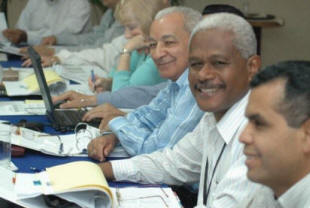 We
are grateful to God for the opportunity and influence that
our ministry has had to impact ministerial training. 2
Timothy 2:2 has long been a guiding verse in our ministry:
“And the things you have heard me say in the presence of
many witness entrust to reliable men who will also be
qualified to teach others.” With one heart, our
international leadership team adopted this verse and
“Priority 1: Transgenerational Ministerial Training” as the
theme for the 2010 Educators Summits. We
are grateful to God for the opportunity and influence that
our ministry has had to impact ministerial training. 2
Timothy 2:2 has long been a guiding verse in our ministry:
“And the things you have heard me say in the presence of
many witness entrust to reliable men who will also be
qualified to teach others.” With one heart, our
international leadership team adopted this verse and
“Priority 1: Transgenerational Ministerial Training” as the
theme for the 2010 Educators Summits.
Join us in believing God for influence
and impact that will leave a renewable legacy of competent,
Pentecostal ministers throughout Spanish-speaking Latin
America for generations to come!
|